By Barbara Magnoni, edited by Jim Luce.
New York, NY. In recent months, I have been working on a research project on Mexican migrants in New York City where we sought to learn the existing and potential demand for financial services, in particular insurance services, in this community. What I have found is that our original question skips a few steps.
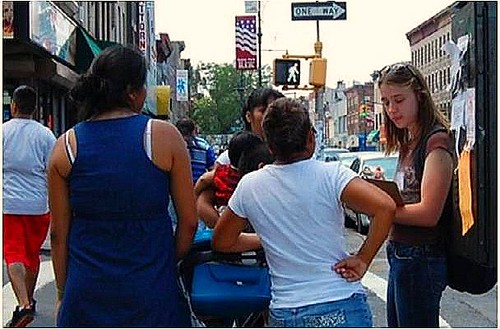
Julia Brown, my star surveyor interviewing Mexican women in Brooklyn. Photo: Betty Salanic.
This community has many needs. Many of the Mexicans that have migrated to New York City are challenged by a new city, new customs, and a new language. Many are also undocumented, which limits their access to good and fairly paid work, social services, and other types of protection. During the work day, Mexicans are all around us -- they provide services like food preparation and delivery, laundry, beauty, and housekeeping, but we often don’t see or interact with them. Laundry is dropped off, food is quickly handed over, nails are painted in silence, and keys are exchanged. They are invisible.
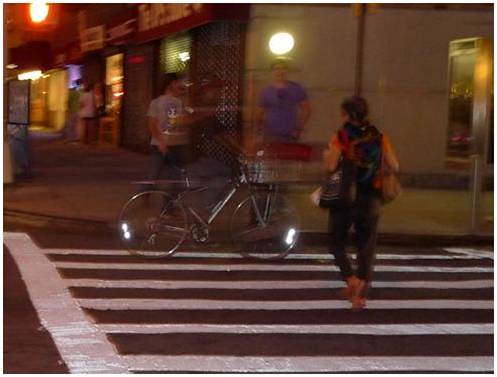
Mexicans provide us services daily, but they can seem "invisible" to us. Photo: Barbara Magnoni.
The Mexican community is relatively new, poor and the fastest growing immigrant community in New York. Yet they are also hard working, many have two jobs, and send 47% of their income home 15-16 times a year. On average, they earn $10,231 per year. Mexicans here face low income, financial strain caused by demands for assistance from family back home, and a low level of access to financial services in the United States. These factors all pose important barriers to members of this community reaching their dreams.
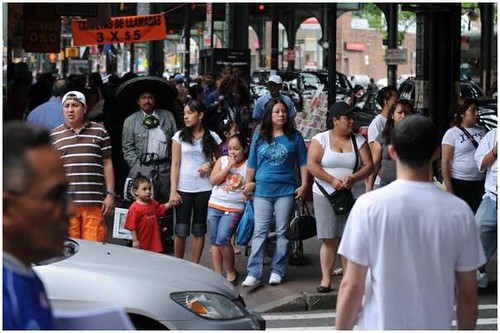
Mexican immigrants crowd the streets of Jackson Heights, Queens. Photo: Marta Magnoni.
Many arrive with limited experience and knowledge about finances. In Mexico, only 25% of families have bank accounts. Only 20% of undocumented Mexicans in New York are estimated to have bank accounts. Other financial products and services such as credit and insurance are even scarcer; instead, most Mexicans in N.Y.C. rely on costly services from money transfer agencies and check cashers. Building assets and having access to tools that allow one to build financial stability are critical to climbing out of poverty. They are a challenge for most native born Americans; for new immigrants, they can be daunting.
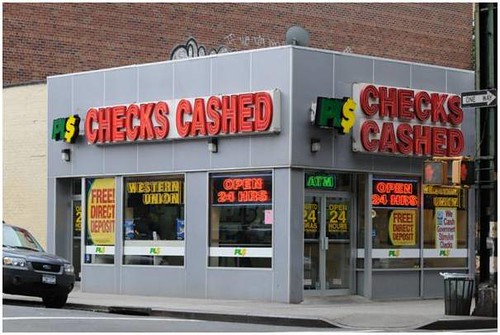
Check cashing agencies are still very popular with the largely unbanked, Mexican Community. Photo: Marta Magnoni.
One new immigrant has decided to tackle this issue head on. I had the pleasure of working with Adrian Franco, Executive Director of Qualitas of Life Foundation, over the course of our research. Adrian came to the United States to learn English after finishing high school. Determined to continue his education in the United States, Adrian applied for college at Boston University. His goal was to learn the basics of business and economic development, and apply these back home.
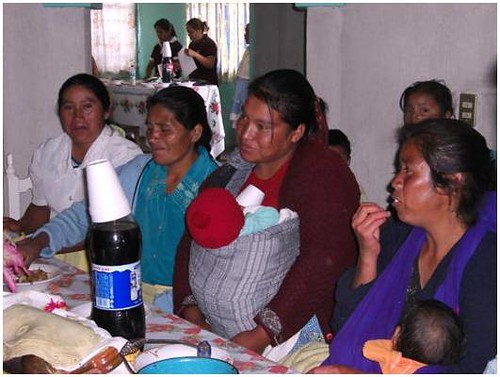
In 2007 I went to Puebla, where most Mexicans in NYC come from.
Rural villages are virtually abandoned by young men, who send money
home to the women, children and elderly left behind. On my visit,
FINCA Mexico had just celebrated the payment of a group loan with a
group of women and was making new loans. Photo by: Barbara Magnoni.
However, when he returned to Mexico in 2000, he was disillusioned working as a junior staff member in the newly elected Fox administration. Working to make Mexico a better place meant dealing with bureaucracy and politics on a daily basis. They didn’t teach that at Boston University. So Adrian came to New York City to pursue a graduate degree at Columbia University’s School of International and Public Affairs.
It was only a matter of time before Adrian discovered his calling, volunteering as a math teacher for new immigrants. Through his teaching, he got to know the immigrant community in the city. This vibrant community had many needs, and suddenly, for Adrian, he had found a way to make a difference for his country, right here in New York City.
Adrian shares the experience of being offered a CD by a bank representative in New York one day, which make him squirm. "I said ‘No!’, because thought he was trying to sell me music. Later I discovered that a CD was a Certificate of Deposit (which is called Deposito a Plazo Fijo) in Mexico. If I had such a hard time understanding the system and my own finances, what could I expect of a migrant with much less education?" It was questions like this one that drive Adrian to apply to Columbia’s School of Education and focus his doctorate degree on financial literacy.
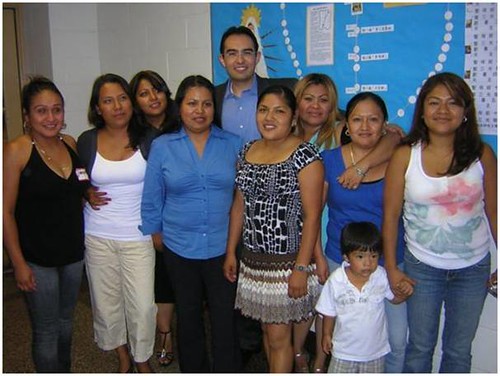
Adrian Franco with a group of students from Qualitas’ basic financial education class in New York. Photo: Courtesy of Qualitas of Life.
Migrants were being offered new products and services, but no one was bothering to take a step back, and give information and education about personal finance. "This is irresponsible. If you have an adult that is only functionally literate, and give them a two hour class and then a public library card, will he go to the library and read Shakespeare in two days?" The same was expected of new immigrants with credit cards, debit cards, remittances and bank accounts.
Two years ago, Adrian took the concept further and started Qualitas of Life Foundation, a non-for-profit organization that provides financial education to immigrants in New York City. Qualitas offers free training on credit, savings, insurance, fraud, and other critical issues to immigrants from every country, and regardless of immigration status. Adrian notes that immigrants are especially vulnerable to fraud when they are not familiar with the system.
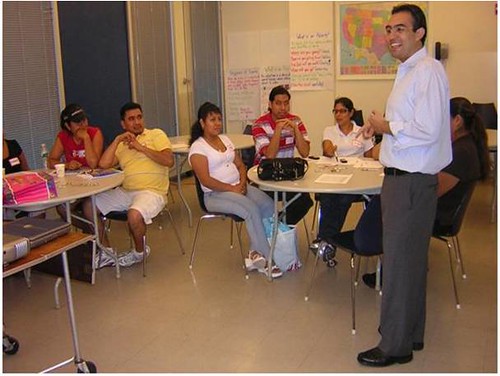
Adrian teaching advanced students the ABC’s of Investing.
Photo: Courtesy of Qualitas of Life, New York.
One woman he advised invested $15,000 into a pyramid scheme run by a charlatan associated with her church. "She took $10,000 of the loan from a zero interest credit card and borrowed another $5,000 from her sister back home. When the zero interest deal expired, and the charlatan ran off with her money, she had to pay over 20% on her credit cards and kept digging a bigger and bigger hole." Notes Adrian. "We helped her to contact professionals that negotiated a payment plan with the credit card company and worked with her to budget her payments, but it will take her a long time before she gets out of this hole."
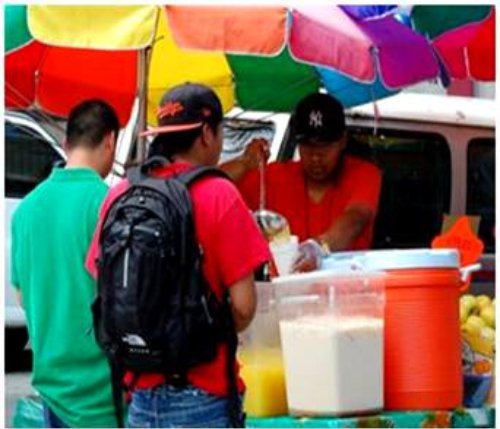
A Mexican entrepreneur serves horchata and mango juice to his customers in Sunset Park, Brooklyn. Photo: Betty Salanic.
Adrian laments; "She came to us after the fact, in our classes, we teach the 7 P’s: Pregunta, Pregunta, Pregunta, Pregunta, Pregunta, Pregunta, Pregunta." That’s "ask" seven times. Qualitas has taught some 800 students throughout the city, through intensive, 10-week trainings.
According to Adrian, "The next challenge is how to reach people in greater scale. People need one-on-one training, but the demand is very high and the cost of training them one on one can be prohibitive." Adrian draws a parallel with Kiyosaki’s book, "Rich Dad Poor Dad." "Most of us don’t have a ‘rich dad’ to prepare us for our financial lives."
See also: Jim Luce on Mexico and Mexican-Americans


